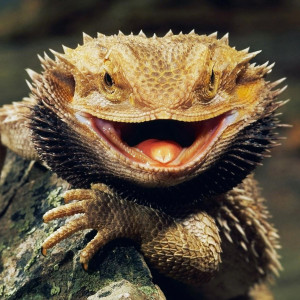The U.S. Centers for Disease Control and Prevention is collaborating with public health, veterinary, and agriculture officials in many states and the U.S. Department of Agriculture National Veterinary Services Laboratories (NVSL) to investigate an outbreak of Salmonella Cotham infections linked to contact with pet bearded dragons purchased from multiple stores in different states.
 Bearded dragons are popular pet lizards, native to Australia (sure, blame Australia), that come in a variety of colors. Public health investigators are using the PulseNet system to identify cases of illness that may be part of this outbreak.
Bearded dragons are popular pet lizards, native to Australia (sure, blame Australia), that come in a variety of colors. Public health investigators are using the PulseNet system to identify cases of illness that may be part of this outbreak.
On January 22, 2014, CDC was notified by the Wisconsin Department of Health Services of a cluster of Salmonella Cotham infections with a high proportion of ill persons reporting exposure to pet reptiles. Since 2012, there have been 12 ill persons infected with Salmonella Cotham in Wisconsin, and 10 (83%) of 12 persons reported contact with pet bearded dragons. Wisconsin receives funding under the CDC FoodCORE (Foodborne Diseases Centers for Outbreak Response Enhancement) program. These centers work together to develop new and better methods to detect, investigate, respond to, and control multistate outbreaks of foodborne diseases.
Salmonella Cotham is a rare serotype. Searching historical Salmonella databases, CDC determined that Salmonella Cotham represents only 0.01% of all human isolates in the United States since 1963. Before this outbreak, typically less than 25 Salmonella Cotham infections were reported to PulseNet annually. Given the rarity of the Cotham serotype and the information gathered by Wisconsin, CDC conducted a search of PulseNet for all Salmonella Cotham infections reported since 2012.
As of April 21, 2014, a total of 132 persons infected with the outbreak strain of Salmonella Cotham have been reported from 31 states since February 21, 2012. The number of ill persons identified in each state is as follows (listed in alphabetical order): Arizona (4), California (21), Colorado (2), Florida (3), Georgia (1), Idaho (3), Illinois (6), Kansas (6), Kentucky (4), Maryland (3), Massachusetts (1), Michigan (5), Minnesota (3), Missouri (7), Nebraska (1), Nevada (3), New Hampshire (1), New Jersey (3), New York (10), North Carolina (2), Ohio (1), Oregon (2), Pennsylvania (5), South Carolina (1), South Dakota (1), Tennessee (5), Texas (6), Utah (3), Virginia (3), Washington (4), and Wisconsin (12).
Among 132 persons for whom information is available, dates that illnesses began range from February 20, 2012 to April 1, 2014. Ill persons range in age from less than 1 year to 79 years, with a median age of 2 years. Fifty-eight percent of ill persons are children 5 years of age or younger. Fifty-one percent of ill persons are female. Among 67 ill persons with available information, 28 (42%) have been hospitalized. No deaths have been reported.
On March 25, 2014, CDC sent a questionnaire to the states involved in the investigation to obtain more detailed information from ill persons about recent contact with reptiles. In interviews, ill persons answered questions about contact with animals and foods consumed during the week before becoming ill. To date, CDC has received a total of 31 completed questionnaires. Twenty-seven (87%) of 31 persons interviewed reported contact with reptiles or their environments before becoming ill. When asked about the type of reptile, 25 (81%) of 31 persons reported contact with lizards; of these 25 persons, 21 (84%) specifically reported contact with bearded dragons, a type of lizard. The percentage of ill persons in this outbreak reporting contact with a reptile is substantially higher than the percentage of U.S. households that reported owning a pet reptile in a survey conducted in 2013-2014 by the American Pet Products Association (5.6%). State and local health departments are continuing to interview ill persons.
The Oregon State Public Health Laboratory has isolated the outbreak strain of Salmonella Cotham from samples from a pet bearded dragon and its terrarium (habitat) collected from an ill person’s home in Oregon.
Lynne Terry of The Oregonian reports Oregon scientists cracked the case after a baby in Marion County got sick. Emilio DeBess, a Public Health Division epidemiologist, decided to investigate. Taking time on his lunch hour in early April, he visited the home and collected nine samples, swabbing two bearded dragons and the surrounding environment. Eight samples turned up positive for the rare strain involved in the outbreak.
DeBess said the baby, who is less than 1 years old, had no contact with the reptiles, which are kept by the parents. The baby was not even allowed in the same room.
